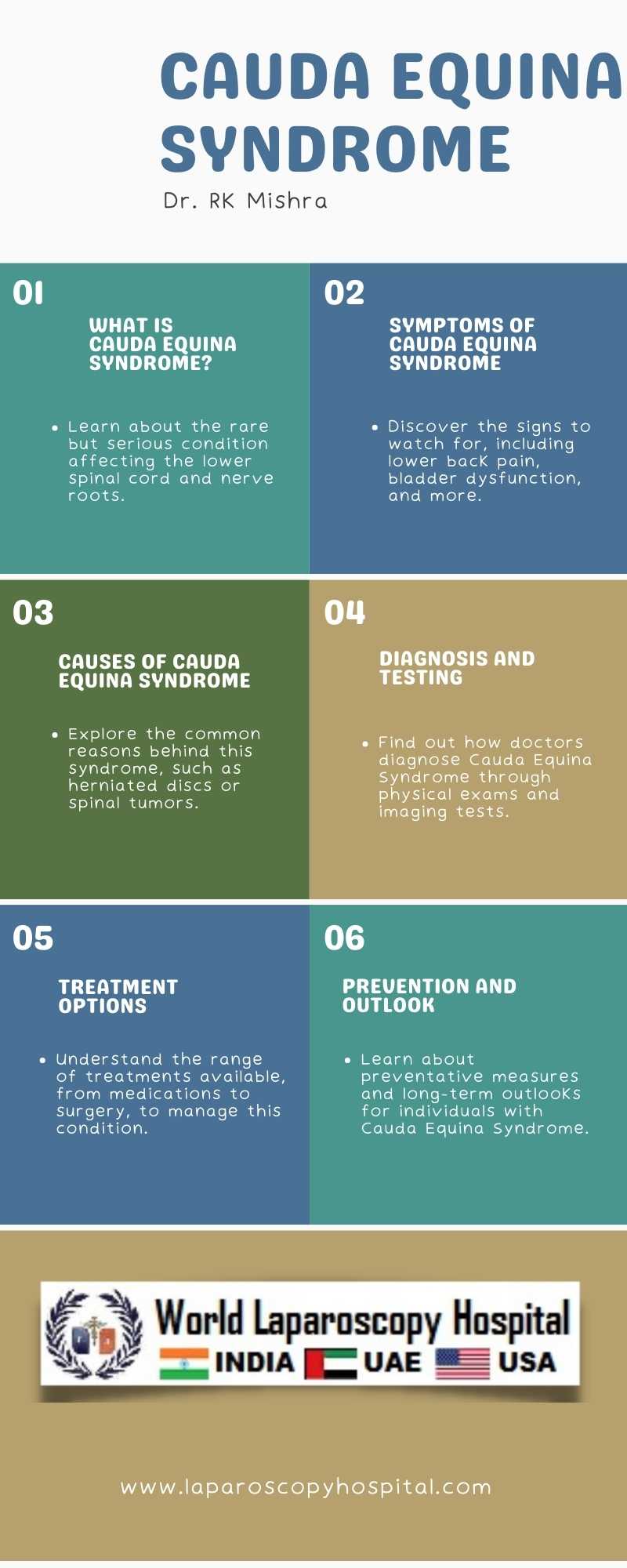Cauda equina syndrome: Compression of the cauda equina nerves, potentially following spinal surgery
Cauda equina syndrome (CES) is a rare but serious condition that occurs due to the compression of the cauda equina nerves at the lower end of the spinal cord. This compression can lead to significant neurological deficits and requires prompt diagnosis and treatment. CES can occur spontaneously or, more commonly, as a complication following spinal surgery.

The cauda equina is a bundle of nerves that extends from the lower end of the spinal cord. These nerves are responsible for transmitting sensory and motor signals to and from the lower limbs, as well as controlling bladder and bowel function. When the cauda equina nerves are compressed, either by a herniated disc, tumor, or other spinal abnormalities, it can lead to symptoms such as severe lower back pain, sciatica, numbness or weakness in the legs, and loss of bladder or bowel control.
In the context of spinal surgery, CES can occur as a result of various factors. One common cause is the inadvertent damage or compression of the cauda equina nerves during the surgical procedure. This can happen due to surgical errors, such as improper placement of instruments or excessive manipulation of tissues. Additionally, postoperative complications such as hematoma or infection can also lead to compression of the cauda equina nerves.
Early recognition and management of CES are crucial to prevent permanent neurological damage. Patients with suspected CES should undergo a thorough neurological examination, including assessment of motor and sensory function, as well as bladder and bowel function. Imaging studies, such as MRI or CT scans, can help confirm the diagnosis and identify the underlying cause of nerve compression.
Treatment of CES typically involves surgical decompression of the cauda equina nerves to relieve the compression. In some cases, corticosteroids may be used to reduce inflammation and swelling around the nerves. Physical therapy and rehabilitation may also be necessary to help restore function and mobility.
Conclusion:
Cauda equina syndrome is a rare but serious condition that can occur following spinal surgery. Prompt diagnosis and treatment are essential to prevent permanent neurological damage. Surgeons should be aware of the risk factors and take appropriate precautions during surgery to minimize the risk of CES. Additionally, patients should be educated about the signs and symptoms of CES so that they can seek medical attention promptly if they occur.

The cauda equina is a bundle of nerves that extends from the lower end of the spinal cord. These nerves are responsible for transmitting sensory and motor signals to and from the lower limbs, as well as controlling bladder and bowel function. When the cauda equina nerves are compressed, either by a herniated disc, tumor, or other spinal abnormalities, it can lead to symptoms such as severe lower back pain, sciatica, numbness or weakness in the legs, and loss of bladder or bowel control.
In the context of spinal surgery, CES can occur as a result of various factors. One common cause is the inadvertent damage or compression of the cauda equina nerves during the surgical procedure. This can happen due to surgical errors, such as improper placement of instruments or excessive manipulation of tissues. Additionally, postoperative complications such as hematoma or infection can also lead to compression of the cauda equina nerves.
Early recognition and management of CES are crucial to prevent permanent neurological damage. Patients with suspected CES should undergo a thorough neurological examination, including assessment of motor and sensory function, as well as bladder and bowel function. Imaging studies, such as MRI or CT scans, can help confirm the diagnosis and identify the underlying cause of nerve compression.
Treatment of CES typically involves surgical decompression of the cauda equina nerves to relieve the compression. In some cases, corticosteroids may be used to reduce inflammation and swelling around the nerves. Physical therapy and rehabilitation may also be necessary to help restore function and mobility.
Conclusion:
Cauda equina syndrome is a rare but serious condition that can occur following spinal surgery. Prompt diagnosis and treatment are essential to prevent permanent neurological damage. Surgeons should be aware of the risk factors and take appropriate precautions during surgery to minimize the risk of CES. Additionally, patients should be educated about the signs and symptoms of CES so that they can seek medical attention promptly if they occur.
1 COMMENTS
Dr. Baljeet Kaur
#1
Feb 24th, 2024 7:06 am
Cauda equina syndrome (CES), though rare, is a serious post-spinal surgery concern. Prompt diagnosis and treatment are critical to prevent permanent neurological damage. Surgeons must recognize risk factors and take precautions. Educating patients about CES signs is vital for timely medical intervention.
| Older Post | Home | Newer Post |


